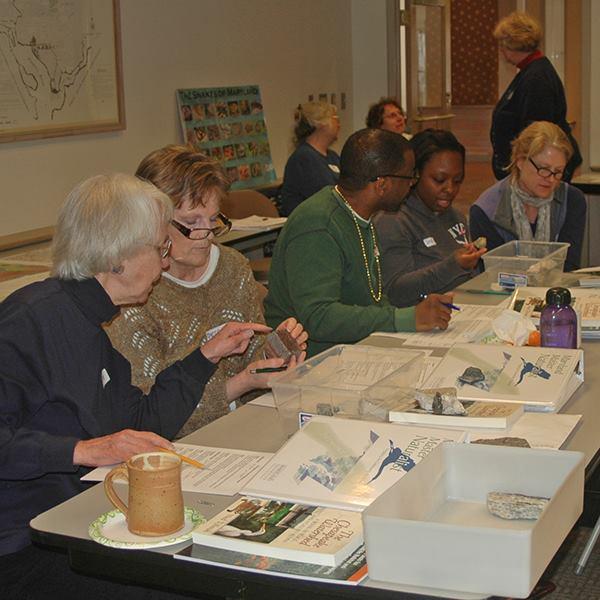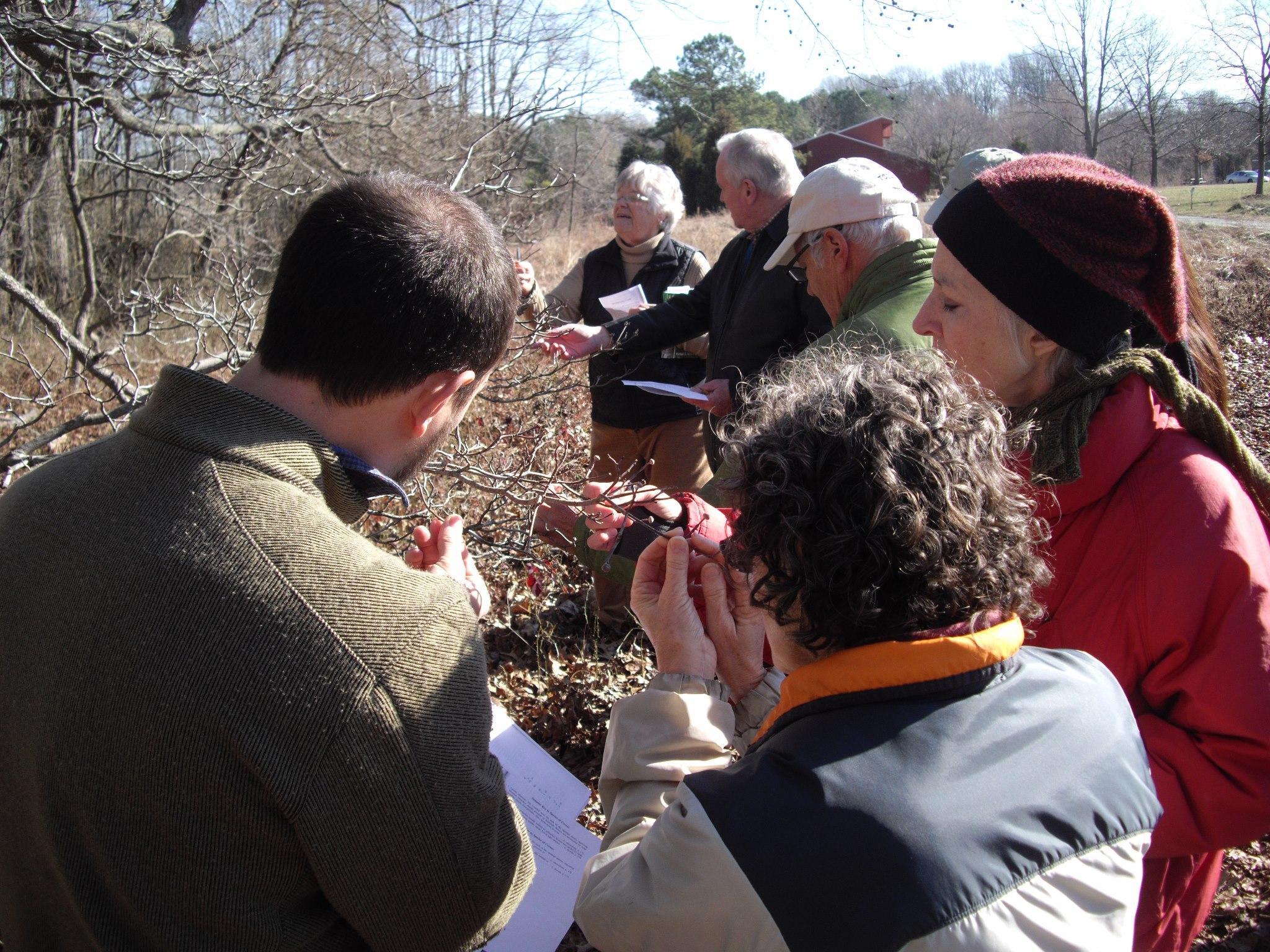There are several main components to training volunteer Master Naturalists. Each program is conducted at a Host Site with adequate indoor and outdoor classroom space and at least one Host Site-selected and approved representative (staff, volunteer, etc) who has completed a Program Facilitator’s workshop. The Program Facilitator will organize the training at the Host Site, line up qualified Speakers/Instructors, advertise the program and fulfill other applicable duties. For more information, see below.
Become A Speaker/Instructor
Master Naturalist Class Instructors are experts who provide instruction both inside the classroom and outdoors. Below is a scene from a class about soils:
Each topic in the Master Naturalist training course is taught by a specialist in that field. Presentations provide an overview of the subject matter while incorporating local information and facts of interest. Classroom lectures and PowerPoint slideshows are supplemented by hands-on demonstrations, labs, and field work. The Program Facilitator organizes the schedule of classes and arranges the day (or half-day) that each instructor will teach.
Become an Instructor
Educational requirements to become an instructor are a minimum of either a Bachelor’s degree in environmental science, education, or a related field, or demonstrated comparable practical experience providing environmental education programs.
The instructor must prepare the class in accordance with the goals of the Master Naturalist Program, as described in the Volunteer Manual. Guidelines and suggestions for successful presentations are supplied (see right). The instructor must also agree to sign a photo release and be evaluated after the class.
Instructors volunteer their time, but they are rewarded by conveying their enthusiasm and skills to a small group dedicated to passing on what they learn. The instructors teach future teachers, enlarging awareness of their particular field of interest and recruiting others to share their interest.
Please contact Joy Rafey at jrafey@umd.edu for more information and to request instructor paperwork.
Host a Training at Your Site
Host Sites must be able to accommodate both indoor and outdoor training with ample space for study and observation:

To accommodate the Master Naturalist Volunteer Training, a facility must have classroom space for 15 to 25 students and grounds suitable for outdoor lessons.
Environmental education centers, conservancies, and arboretums are all good potential Host Sites, especially if they are within driving distance of an interesting location for the class field trip.
The Host Site must have a trained Master Naturalist Program Facilitator*, preferably an employee or associate, to organize and oversee the course. Familiarity with the Host Site and its organizational mission is an advantage when recruiting participants and instructors and managing your trained volunteer Master Naturalists.
*for more information on Program Facilitators, please click "Become a Program Facilitator" below
Benefits for the Host Site
The Host Site and the Program Facilitator are expected to tailor the training course to their local conditions and objectives. The volunteers, after training, will donate their skills to the Host Site and the community it serves. Providing this program is also good publicity for the Host Site.
Please contact Joy Rafey at jrafey@umd.edu for more information and to request a Host Site application.
Host Sites in Maryland
Some Host Sites are active in more than one physiographic region. To date, the following facilities/organizations have served as a Maryland Master Naturalist Volunteer Training Program Host Site:
The Coastal Plain Region
- Adkins Arboretum, Ridgely
- American Chestnut Land Trust, Prince Frederick
- Anacosta Watershed Society, Bladensburg
- Anita C. Leight Estuary Center, Abingdon
- Black by Nature, Baltimore/Statewide
- Blackwater National Wildlife Refuge, Cambridge
- BLISS Meadows/Backyard Basecamp, Baltimore
- Chesapeake Bay Environmental Center, Grasonville
- Elms Environmental Education Center-SMCPS, Dameron
- Gunpowder Falls State Park, Baltimore/Harford Counties
- Marshy Point Nature Center, Baltimore
- Maryland Department of Natural Resources - Wildlife & Heritage Service, Annapolis
- Masonville Cove Environmental Education Center, Baltimore
- Nanjemoy Creek Environmental Education Center, Nanjemoy
- National Aquarium, Baltimore
- North Point State Park, Edgemere
- Patuxent River Park, Upper Marlboro
- Phillips Warf Environmental Center, Tilghman
- Pickering Creek Audubon Center, Easton
- Quiet Waters Park, Annapolis
- St. Mary's College Environmental Studies Dept., St. Mary's City
- ShoreRivers, Eastern Shore
The Piedmont Region
- Banneker Historical Park, Baltimore
- Bear Branch Nature Center, Westminster
- Black Hill Visitor Center & Nature Programs (BHNP)/Montgomery Parks, Boyds
- Brookside Nature Center/Montgomery Parks, Wheaton
- Carrie Murray Nature Center, Baltimore
- Catoctin Creek Nature Center, Middletown
- Charlotte's Quest Nature Center, Manchester
- Cromwell Valley Park, Parkville
- Cylburn Arboretum, Baltimore
- Eden Mill Nature Center, Pylesville
- Fountain Rock Nature Center, Walkersville
- Goucher College, Towson
- Hashawha Environmental Center, Westminster
- Holt Park & Center for the Arts, Baltimore
- Howard County Conservancy - Belmont, Elkridge
- Howard County Conservancy - Mt. Pleasant, Woodstock
- Irvine Nature Center, Owings Mills
- Lake Roland Park, Baltimore
- Locust Grove Nature Center/Montgomery Parks, Bethesda
- Maydale Nature Classroom, Montgomery
- Meadowside Nature Center/Montgomery Parks, Rockville
- Nature Forward (formerly the Audubon Naturalist Society), Chevy Chase
- Oregon Ridge Nature Center, Cockeysville
- Piney Run Park Nature Center, Sykesville
- Robinson Nature Center, Columbia
- Stillmeadow Community Projects, Baltimore
The Mountain Region
- Cunningham Falls State Park, Thurmont
- Deep Creek Lake State Park, Swanton
- Gambrill State Park, Frederick
Become a Program Facilitator
Program Facilitators manage all aspects of the Maryland Master Naturalist's experience, from trainee recruiting, to program scheduling, to instructor selection, to volunteer service coordination and tracking. The best part is learning side-by-side with your Master Naturalists:

Who can become a Program Facilitator?
Anyone with a connection to an environmental agency or organization who has a desire to cultivate a cadre of trained volunteers can become a Program Facilitator.
What does a Program Facilitator do?
Prospective Program Facilitators must be trained in order to implement the Maryland Master Naturalist Program (see below). Once trained, Program Facilitators work closely with their Host Sites* to organize and administer all aspects of the 52-hour volunteer training schedule and the 8-hour field trip, including promoting the program and publicizing the training, reviewing and selecting applicants to admit to the training as volunteers in service to their Host Sites, selecting and managing speakers/instructors, coordinating classroom logistics, and providing speaker materials and other resources to Master Naturalist trainees. Program Facilitators are also responsible for keeping track of Master Naturalist volunteers by approving/reporting volunteer service hours annually and advising these volunteers on ways to fulfill their 40 hours of Volunteer Service and 8 hours of Advanced Training each year.
*for more information on Host Sites, please click "Host a Training at Your Site" above
How do I receive the required Program Facilitator training?
Prospective Program Facilitators receive one-on-one training at their Host Site from UME. Occasional Group Program Facilitator Workshops have been held at the Maryland Association for Environmental & Outdoor Education Annual Conference http://www.maeoe.org/ and at Robinson Nature Center, which is centrally located in Howard County.
Please contact Joy Rafey at jrafey@umd.edu for more information and to schedule a Program Facilitator training.
When should I conduct a Master Naturalist Volunteer Training?
As a Program Facilitator, you are required to hold a Volunteer Training consisting of 52 educational hours and one 8-hour field trip at an approved Host Site within 12 months of completing Program Facilitator training in order to remain a qualified Program Facilitator, otherwise re-training may be necessary.